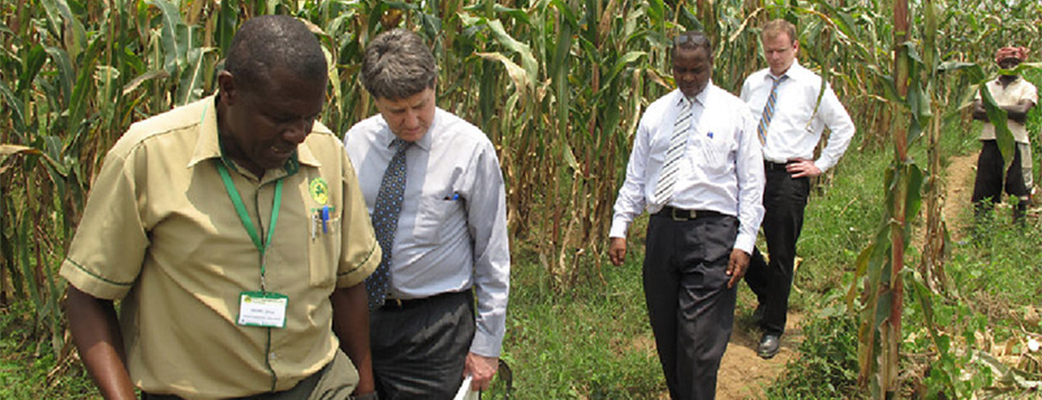When you hear the name Land O’Lakes, you probably think of a few things. Butter, of course. Farmers. Co-ops. Maybe even our namesake, Minnesota. But as you move down the list, Rwanda likely doesn’t spring to mind. It should.
To state it far too simply, Rwanda has had a rocky history. After the devastating 1994 genocide in Rwanda, the country’s economic, social and institutional frameworks were decimated. In the years since, the Rwandan government has been proactively working to transform the agricultural sector to help strengthen its economy. The United States government is lending support to advance this goal, too, by funding ag programs through the U.S. Agency for International Development (USAID).
Since 1981, Land O’Lakes International Development has been focused on improving livelihoods around the world through these types of USAID-funded ag programs. Rwanda, included.
Alongside our international development colleagues, and with our cooperative roots, we are uniquely positioned to address local and global challenges. We believe in the co-op system so much that we see it as a key tool in developing sustainable agricultural and business markets in emerging nations.
The co-op equation
Purely defined, a cooperative is an association of people who voluntarily work together to create mutual social, cultural or economic benefit. Back in 1921, Land O’Lakes, Inc. started as a dairy marketing cooperative when our founding members saw an opportunity to gain access to bigger markets. They came together again a few years later when they realized they could benefit from purchasing the products they needed to grow their crops—cooperatively.
This model is an effective way for farmers to organize so that they can become viable and attractive business clients of input suppliers and service companies. A co-op also enables individual farmers to aggregate both the supply of what they grow, and the demand of getting access to agricultural inputs and services. This is critical for smallholder farmers, who typically farm on less than an acre of land and live in geographically dispersed areas, often connected by poor market infrastructure.
Today, we see a few great things are coming together in Rwanda. The government is encouraging fresh thinking on public-private alliances. There are local dairy cooperatives that are open to new ways of supporting farmer-members. And, the country, the size of Maryland, is a manageable size for a pilot project. As cooperative nerds, we wondered if this could be a perfect equation for introducing a distribution-focused cooperative model to Rwandan agriculture.
Our International Development team posed this question to Keith Newhouse, a plant geneticist by trade, now the director on the Innovation and Business Development team for the Land O’Lakes, Inc.’s crop inputs business Winfield US (Winfield United Suppliers).
His answer?
"I don't know, but let's find out."

An Alliance is born
With funding from USAID, the Seed Cooperative Alliance (the Alliance) was formed in 2013. Together, it is a hybrid group of experts working together—Land O’Lakes, Inc., Land O’Lakes International Development, African seed company Seed Co, and local cooperatives from across the region.
We’re sharing our knowledge and sales approaches from our crop inputs business, Winfield US, with Seed Co, while Land O’Lakes International Development bridges the gap between Seed Co and the fourth and final partner, the local Rwandan cooperatives.
Currently working with 15 cooperatives in two countries—Rwanda and Tanzania—the Alliance is testing and promoting a cooperative model that offers customized services to cooperative members and emphasizes buying new hybrid seed varieties.
“Land O’Lakes has been an excellent ally in helping us build trust with the local co-ops,” says Kasaija Banake, Seed Co manager. “Previous work they’ve done in Rwanda has given them a credible reputation in the farming communities, so the co-ops trust us [Seed Co] through association.”
The Alliance’s long-term goal is to develop a trust-driven, sustainable approach for cooperatives and the private sector to make hybrid maize seed more available to smallholder farmers. The theory is that more hybrid seed will increase crop productivity in the region to meet growing demand for maize.
Early Alliance successes
Since the beginning, the Alliance has been working to ensure that Seed Co has a strong and sustainable relationship with the cooperatives. From our experience, we know that empowering independently owned and operated agricultural retailers with tools and technical know-how can help the cooperative and its members.
“We know through our WinField US business that a distributor’s word is only as good as the inputs, knowledge and training they provide. So we tried to foster success from the very beginning,” says Keith.
Advice included both tactical tools and approaches, such as the introduction of a low-cost manual planter that alleviates the need to bend down when planting and fertilizing, demonstration plot set-up support, creation and distribution of an agronomy manual, as well as training on cooperative management and gender inclusion.
Co-op comes full circle
Over three years, the Alliance has helped cooperatives engage in partnerships with multiple seed and fertilizer companies. Those companies have since provided valuable services to cooperative members. By using hybrid seeds, farmer-members are experiencing lower costs of production, higher yields and getting better prices for their produce at market. And best of all, the farmer-members are recognizing even more opportunities to improve their livelihoods.
“Farmers come together to market their milk. A co-op forms. Those same farmers also want to grow corn more efficiently. They buy inputs together. Put simply, this story is not all that different than the history of Land O’Lakes,” says Keith. “Our feed and crop inputs businesses emerged in 1929, eight years after farmers started marketing milk commodities together. The parallels are profound.”
The Alliance partners continue to work together toward the ultimate goal of bringing this model to scale in Rwanda for the benefit of cooperatives, farmers and the overall economy.